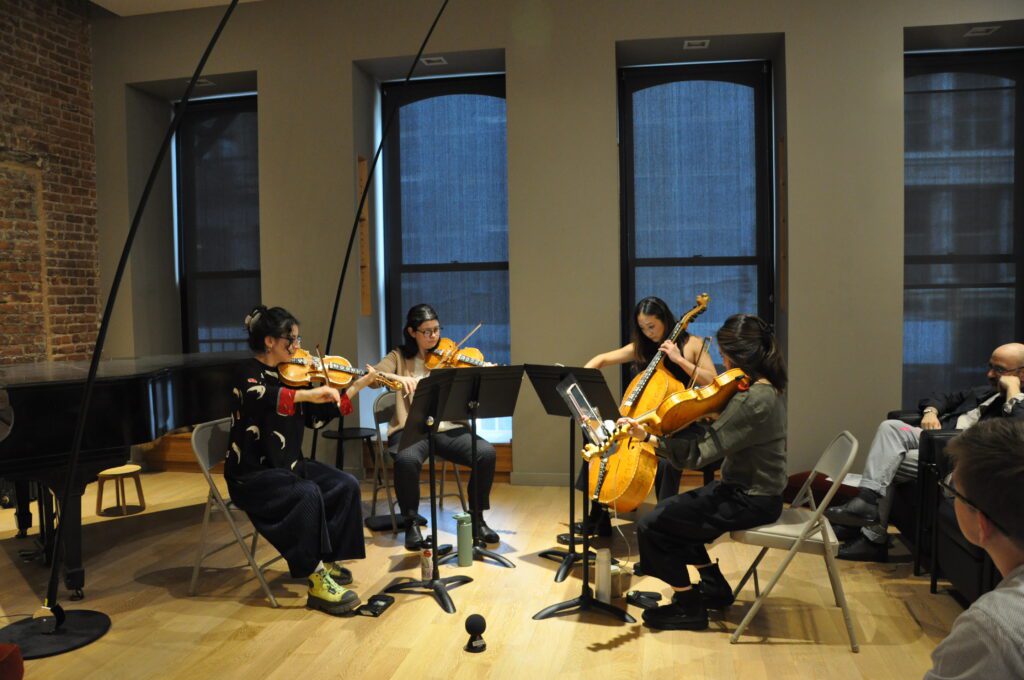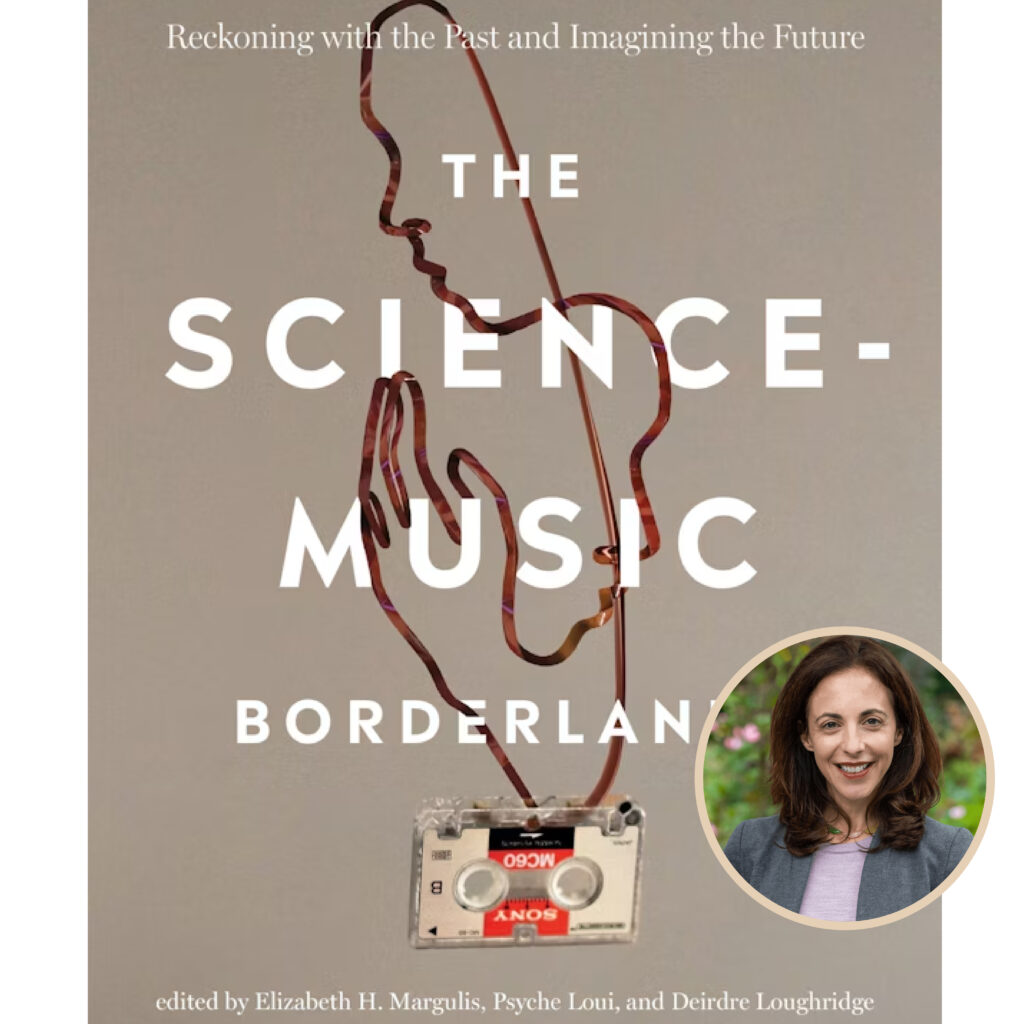By: Heather O’Donovan ’16
When William Shubael Conant Professor of Music Steven Mackey was elected into the American Academy and Institute of Arts and Letters this winter — an accolade that sets him alongside eminent colleagues from Philip Glass to John Luther Adams to fellow Princetonians Steve Reich and Paul Lansky — he’ll admit, it made him feel “like one of the old fuddy-duddies.” It’s a remark that’s characteristic of Mackey: the rock-and-roll ethos of chafing against establishment, the tongue-in-cheek rebuke of honorifics, yet the winking admiration for his Academy peers who, he acknowledges, are anything but “fuddy-duddies.”
Listen to Mackey’s music — whether the seductive vitality of his 1992 composition for electric guitar and string quartet Physical Property, the bacchanalian tapestry of his enticingly enigmatic Dreamhouse (2003), or the freely-associating romp of Banana/Dump Truck (1995) — and one gathers the impression Mackey is not quite a museum piece.
Indeed, it was precisely his compositional vitality that electrified the Kimmel Center’s Marian Anderson Hall one otherwise gray March afternoon in 2024 when virtuoso guitar polymath JIJI strode onto the stage decked in a pair of flaming cowboy boots and commenced to tear through Mackey’s latest electric guitar concerto, Aluminum Flowers.

Photo Credit: Margo Reed Studio
Aluminum Flowers, a concerto for solo guitarist playing both electric guitar and nylon-string “classical” guitar, began, as new works often do, with a commission. Philadelphia’s prestigious Curtis Institute of Music was planning its centennial celebration, and the institute tapped Mackey, who’d been appointed to Curtis’ faculty in fall 2022, to compose a new work specially for the festivities.
Given carte blanche for the composition, Mackey pulled from the coffers of an artistic collective that had offered both inspiration and camaraderie in recent years — international guitar collective Another Night on Earth — and recommended JIJI, a Curtis alum (now Associate Professor of Guitar at Indiana University’s Jacobs School of Music), to be the “frontwoman,” as it were, of a new concerto celebrating the centuries-long development of the guitar, from nylon-string “classical” to electric and all the rich repertoire and techniques developed therein.
“I started Another Night on Earth with a classical guitar player in Germany during COVID. We wanted to get a group together with guitarists from different backgrounds. When the commission came through from Curtis, I really wanted an electric guitar concerto, so I suggested JIJI, a member of the collective who plays both classical and electric guitar and also happens to be a Curtis alum.” — Mackey

Photo Credit: Margo Reed Studio
The act of music composition, for Mackey, is synonymous with discovery. In each composition, he seeks to build what he refers to as a “grammar” of music (“as Bach did”), using a myriad of instrument configurations and internal rules. So, it made sense that an early step for his new commission would be to figure out its grammar.
He began not with his hands on a blank score but rather on the electric guitar, the “mother tongue” of his itinerant youthful years. “You have to get started somehow,” Mackey later explained, looking back on the months-long process that was now mere weeks from being realized on stage. “I started with an exercise on an ancient technique that goes back to the early Baroque: ground bass. I wanted to see, if I just had an A and an F oscillating in the bass, what kind of harmonies and melodies could I create above it? It was a prompt to get me going.” That ended up being the first movement, called “Introduction.” From there, Mackey was free to run the remaining movements (five total movements; four “felt too traditional”) through “the filter of A and F,” thereby discovering the rest.
“Whenever I was at a crossroads, I’d ask myself: how can viewing this from the point of view of A and F help me decide which path to take?” — Mackey
This exercise also served as the genesis for what would become the work’s title, Aluminum Flowers, on the initials A and F. Noticing the different-colored wires running in and out of his pedal board (for effects), he began to see a striking image: “They looked like veins connected by a stem, but they’re all made of metal. I started to riff on that: pedals and petals, metal, flowers… Aluminum Flowers.”
Although Mackey’s compositional work began, as it often does, with improvisation on his electric guitar, he didn’t compose entirely in a vacuum. From ideation all the way through completion of the preliminary drafts in summer 2023, there were frequent emails back and forth to his virtuoso collaborator — which had since become not just one, but two virtuoso collaborators.
“[Over a decade ago] I heard Physical Property on Kronos Quartet’s recording, and I was obsessed with it. Then I read through it and was like, I can’t play this. I’ve always known about Steve’s work. So, this is actually a dream come true.” — JIJI
As a Curtis alum and longtime Mackey fan, JIJI was on board from the start. But when a residency for Another Night on Earth with David Robertson and the Utah Symphony arose shortly after JIJI had signed on to play the Philadelphia premiere, Mackey saw a unique opportunity at hand: “[Electric guitarist and lead guitarist of Zepparella] Gretchen [Menn] and I had been talking about me writing a concerto for her for so long. So, we decided that for the Utah performance, we’d put JIJI on the Concierto de Aranjuez by Rodrigo, which is a real barnstorming crowd favorite. (An esoteric guitar co-op needs to have something that’s gonna reach the people.) And we’d put Gretchen on Aluminum Flowers.”
“Gretchen and JIJI have different approaches: Gretchen is more of an electric guitar player, but also plays classical, and JIJI is more of a classical player but also plays electric.” — Mackey
Over the next several months, the three polymaths — JIJI, Menn, and Mackey — each virtuosic in their own right, set about to reconcile technical sticking points to bring Mackey’s vision to life. In one instance, inspired by the classical guitar technique called Recuerdos de la Alhambra technique, which employs a tremolo, he sent JIJI and Menn an example and asked if they could play a tremolo while playing certain chords to create the effect of a long, singing phrase. “Turns out they couldn’t. So, I found a different way, instead of that tremolo, to achieve a similar effect.”
On another occasion, Mackey wanted the pair to try a technique he’d been using in free-improv contexts for years: a prepared guitar, with a pick threaded through the three lowest strings, to achieve an almost gong-like, rather than pitched, effect. “Gretchen and I lost our minds testing out hundreds of different picks of different sizes,” JIJI recalled, mere minutes after her own pick fell out of the guitar during the final room run. “It may seem like a difference of 0.5 to 0.58 millimeters isn’t a big deal, but it makes a difference. I lost my lucky pick, so I had to go get new ones. I’m going to chew on the new pick so that it has a bit of texture — and will hopefully stay in during the performance!”
As for Menn, the prepared guitar proved a quandary: “For some reason,” Mackey explained, “it just wouldn’t work on any of Gretchen’s guitars.” Launching into problem-solving mode, he sent Menn an instructive video; ultimately, however, a visit to California in October 2023 helped the pair diagnose the issue: the action on Menn’s guitar (the distance of the strings from the fingerboard) is lower than that of Mackey’s or JIJI’s. The solution? Possibly a trip to the luthier, who may be able to raise the action on Menn’s guitar just enough in advance of the Utah performance; otherwise, there’s always the safety net of playing on Mackey’s guitar in performance.

Photo Credit: Renee Jahnke
Speaking in the leadup to the Utah performance, Menn gushed about Mackey’s concerto: “It’s like an amusement park for a guitar player.” It’s a sensation of rollicking fun that both Menn and JIJI are satisfied to finally attain after months of intense work. The pair have found an easy camaraderie these past several months and text, if not daily, pretty close to it. A lot of those text exchanges focus on problem-solving, as in the prepared guitar predicament, and recommendations. “JIJI had never played slide guitar,” offered Menn as one example of a typical exchange, “so I was able to recommend the slide that I use. Meanwhile, JIJI, who is a virtuoso of the highest caliber, helped me on a bunch of classical stuff that’s outside of the difficulty level of what I had done previously. It’s incredible to have the honor of getting to pick her brain.” Other times, they’re just texting about how downright cool, even “badass,” the concerto is.
“I’ve told Steven this before — he really underestimates himself as a guitar player. He’s humble about his guitar playing, but some of the stuff he writes and plays is so unique to him that it’s not easy to step in and do it. I’m for sure a better guitarist because of this concerto.” — Menn
When Menn saw on Instagram that JIJI happened to be traveling to California for a gig in February, just a month before the Philadelphia premiere and two months before the Utah performance, she invited her over: “Next thing we knew, we were hanging out in my apartment with my cat, going through the concerto.” That’s one lucky cat.
Moving back and forth between electric and classical guitar is not for the faint of heart, and Mackey’s concerto — for this and other reasons — therefore makes incredible technical demands of its soloists. (It is partly for this reason that Mackey — who has performed his signature work Physical Property, for example, hundreds of times — declined to serve as soloist for Aluminum Flowers; he doesn’t play much classical guitar.) “On classical guitar,” JIJI explained after rehearsal one late afternoon in March, “the neck is wider, which means you can do hand picking. On electric guitar, the neck is skinnier, which means it’s easier to control with a pick. The neck is way longer on the electric guitar. I have to practice switching between the two guitars — it doesn’t come easily. Even the volume of the instruments is so different. The classical guitar is intimate and quiet — which, of course, makes it so exciting when, in the fourth moment when I’m playing classical, Steve literally writes, like a ‘bat straight outta hell.’ It’s the opposite of what the classical guitar wants to do.”
Mackey’s music frequently digs into such notions of contrast. He revels in the sound that results “when the polite classical guitar turns into stadium guitar” and delights in “the irony between,” say, the “silly instrument whirls” of movements three and four (played on Whirly Tube) “sounding simultaneously with otherwise serious music.”

Photo Credit: Margo Reed Studio
Full rehearsals with JIJI, Mackey, conductor Robert Spano, and orchestra began at the Curtis Institute in early March. Run-throughs of each movement — the “Introduction,” played on classical guitar; “Echo,” on electric guitar, incorporating a delay effect pedal to intoxicating effect; “Canción,” a lyrical movement inspired by the sound of Carlos Santana and accomplished through overdrive and distortion; “Fantasia,” on prepared electric guitar with bottleneck slide, interrupted by classical guitar quoting a 16th-century fantasia by Alonso Mudarra “like a bat outta hell”; and “Loop,” which employs a looper to build an orchestral texture within the electric guitar that the full orchestra then borrows to build to a big finish — were followed by efficiently-dispensed notes and adjustments quickly-made by the consummate young musicians of the Curtis Symphony Orchestra. By the time JIJI strode onto the stage on March 9th, they were ready to rock.
“This is my fourth concerto that I premiered, but I’ve never played a concerto like this before. The concerto tradition is soloist with orchestra, but you don’t see a lot of electric and classical guitar together. Plus, having looper and other technologies makes it a very contemporary piece. Steve is so good at intertwining these two different worlds into one, that it feels so cohesive — and fun.” — JIJI

Photo Credit: Margo Reed Studio
Over the next month, as JIJI pivots back to other projects (including the upcoming Rodrigo Concierto de Aranjuez), Menn ventures into crunch time for the Utah performance. Her performance of Aluminum Flowers is bound to be distinct. “There’s no one sound for guitarists,” explains Mackey. “Individuality is what makes the difference between electric guitarists from Jimmy Page to Led Zeppelin to Steve Vai to Jimi Hendrix. Both Gretchen and JIJI have their own identifiable sounds that I wager will sound more different than two different violinists playing the same violin concerto.”
As for JIJI, while her initial experience with Aluminum Flowers may have arrived at its closing double bar, she hopes there will be a repeat sometime in the future. “Hopefully, once we have this recording, it’ll be a way to get people interested in programming the concerto on future concerts.”
In Other News

Resonant Revival: How a Norwegian Folk Fiddle Found a New Voice at Princeton
May 19, 2025
Dan Trueman, Chair of the Music Department, introduces Norwegian folk instruments to a new generation of composers and performers.

Elizabeth Margulis on the Frontiers of Music Cognition
Jan 22, 2025
The Department of Music is thrilled to congratulate musicology professor and Director of Graduate Studies Elizabeth Margulis, who has received the Ruth A. Solie Award for her editorial contributions to The Science-Music Borderlands: Reckoning with the Past and Imagining the Future.

Announcing the Launch of Princeton in Leipzig
Jan 7, 2025
Enrollment in “Princeton in Leipzig” has been extended to March 2, 2025! The Princeton Music Department is excited to announce the launch of Princeton in Leipzig, a summer study abroad …
